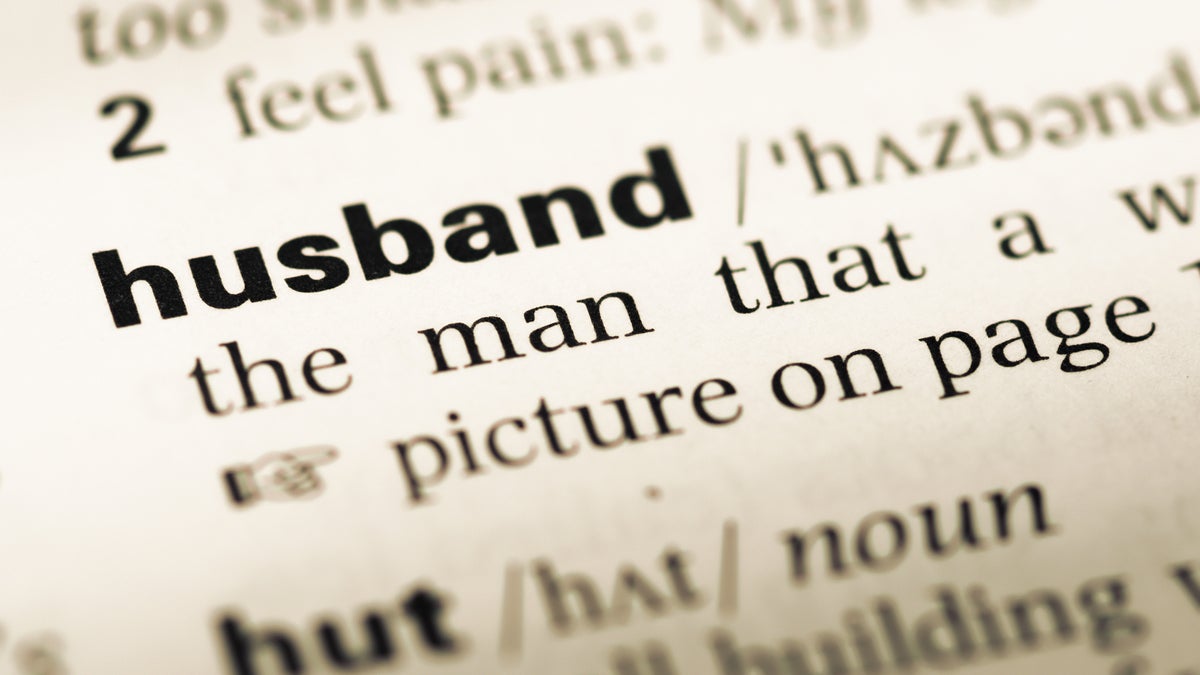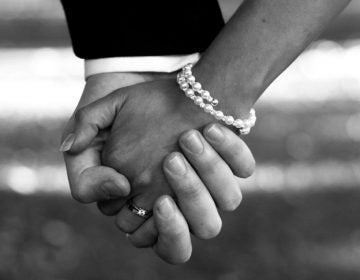No husbands here

(TungCheung/Big Stock Photo)
I still can’t redeem “husband” and “wife.” No matter if the terms refer to two brides in tie-dye or tuxedos; not even if the husbands are Teamsters strolling hand in hand. I can’t shed the centuries of stereotype-bolstering baggage.
We were having a little domestic problem at my house.
My housemate, about to undergo a shoulder surgery that would require her to sleep in a reclining position, has one of those stuffed-wedge things — you’ve seen them; they look like a comfy chair that got cut off below the belt — that’s commonly called a “husband pillow.”
But there are no husbands at this address. There are five women — my partner and me; our 15-year-old daughter; our shoulder-compromised housemate and her partner. So it feels a little strange for any one of us to imagine lounging in the embrace of a “husband,” albeit one made of burgundy cloth and fiberfill.
I had a pillow like that when I was a teenager. I even schlepped it to college, and I was grateful for its comfort as I read Chaucer on my upper bunk. My pillow was pink and popsicle-green gingham, with a ruffled edge. (A secretly gay “husband,” or just a trendy metro-sexual, confident enough to dress in bubblegum hues?)
Back then, we called the thing a “silent husband,” and not even my Intro to Women’s Studies class spurred me to unpack the term: Was it meant to suggest that the ideal husband would wrap me in a wordless hug? Or was it a sly bit of sexism, funny because a “real man” (unlike this stuffed surrogate) would never sit still and be quiet?
I left the pillow behind when I moved to Oregon at age 23. For a while, my only bedmates were books — mind-jolting essays and poetry by Betty Friedan, Shulamith Firestone, and Adrienne Rich that I gobbled in a kind of self-directed Women’s Studies 2.0. Some of those books offered a critique of matrimony as a state-sanctioned bondage no right-thinking feminist would consider (not even if she kept her name and omitted the word “obey” from her vows).
As it became clear that a husband, silent or garrulous, would not be entering my life, I stopped thinking about the term entirely. Well, not entirely. There was the night when my beloved Pop-pop, shuffling to bed on the arm of his caregiver, passed the dining room table where my partner and I sat in deep concentration.
“Look, Al, the girls are playing Scrabble,” the caregiver said.
“Well, I knew they weren’t out looking for husbands,” he quipped.
And another time, playing Taboo at the Shore as my cousin Marc tried to make his team guess the word “rooster” without offering clues of “crow” or “morning” or “cock-a-doodle-doo,” he finally blurted, “The animal that’s the husband of a chicken!”
It became a family joke: All we have to say is “husband of a chicken” to set off Atlantic waves of laughter.
For years, that’s where those terms lived for me — “husband” and “wife” — in a zone where irrelevance lapped with humor, outdated as “antimacassar” or “panty-girdle.”
Because, back then, we — and by “we,” I mean the Dykes on Bikes and Radical Faeries and early denizens of the “gayby boom” with infants in rainbow-colored onesies — were eager to rewrite the script of family life, to rip it open and make it big enough to accommodate ex-lovers, best friends, non-monogamists, trans men and women, the whole unruly clan.
Then, in the space of a decade or so, the world turned upside-down. Queer people started marrying left and right (I mean that in political terms; the same-sex marriage movement made bedfellows, so to speak, of progressives and conservatives.)
Playwright Tony Kushner, while accepting an award at a local synagogue, told a funny anecdote about his husband, and no one flinched. My best friend, though her commitment ceremony pre-dated same-sex legal marriage in Pennsylvania, freely used the term “wife.”
My partner and I, even after we married in the fall of 2014, stuck to … well, “partner.” And while that once had seemed revolutionary, baffling to outsiders (“Partner? Hmm…what exactly is it you two do together?”), it now marked us as fusty old-school feminists.
Which — um — we were. But it wasn’t just stubbornness at work. There were facts, m’am, an etymological dig that laid bare the origins of “husband”: Old Norse, húsbóndi, meaning “master of a house,” from hús (house) and bóndi (occupier and tiller of the soil, a meaning preserved in “animal husbandry,” which — sorry, Cousin Marc — does not refer to the relationship between the rooster and his feathered mate).
And “wife,” the flip side of the marital equation? Not such a happy trail: the word is of Germanic origin, wīban (woman) and may derive ultimately from the Indo-European roots ghwībh (shame; pudenda) or weip (to twist, turn or wrap). Then there’s “alewife,” “fishwife,” and “housewife,” none of them exactly proclamations of glamour or glory.
So the “husband” (master of the house) is defined by what he does; the “wife” (twisted, turned, wrapped) by what is done to her, whom she helps, or what she has (that shameful pudenda). No wonder mid-century feminists wanted to steer clear.
Thanks to my thirty-something friends, I’ve lately embraced “queer” as a capacious umbrella that includes butches, femmes, faeries, trans and gender-variant people, the exuberant LGBTQ rainbow. What I like about “queer” is its communality—it’s a canopy, not a box. And the sound—bendy beginning and lovely long Es, as opposed to the hard K of “dyke,”—is more aslant than assault.
But I still can’t redeem “husband” and “wife.” No matter if the terms refer to two brides in tie-dye or tuxedos; not even if the husbands are Teamsters strolling hand in hand. I can’t shed the centuries of stereotype-bolstering baggage.
Which leads us back to the bedroom, where the personal is still and always political. After the shoulder repair, we will bring our housemate iced mint tea, then crank up the air conditioner so she can recuperate in the cuddle of her … Pillow-pal? (Too cutesy.) Fiber-bunny? (Nah, sounds like one of those virtual pets.) Wedgie? (Definitely not.)
I remember when my friend Charles’ two-year-old first slept in a “big boy bed.” He toddled downstairs the next morning to report that he and his “companion” (the bed rail his anxious parents had installed to keep him from tumbling out) had had a fine night.
Remember when “longtime companion” was code, in an obituary, for “partner of a closeted queer person who died”? Turns out “companion” has a tender etymology of its own: from the Old French compagnon (mate, friend, partner) and Late Latin companionem (bread fellow).
Ah, there’s a concept I can embrace: the one who feeds you, and whom you feed in turn. In joy, in sorrow, in a post-surgery haze, in burgundy cotton or pink ruffles, with arms always open, always outstretched.
WHYY is your source for fact-based, in-depth journalism and information. As a nonprofit organization, we rely on financial support from readers like you. Please give today.




